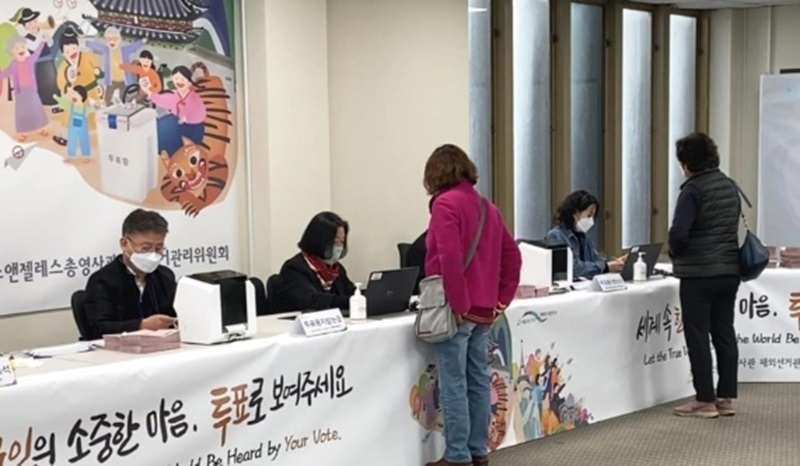As general elections in South Korea approach, officials assigned to the United States by the National Election Commission of South Korea have come under fire for exercising judicial investigative powers, including cracking down on supposed election-law violations, without the consent of the U.S. government.
Kim Nak-hyun, an election official assigned to Atlanta, Georgia, has been investigating election-related advertisements published in the newspaper of the Atlanta branch of the Korea Daily and has been investigating the advertiser and the newspaper’s workers for possible violations of Korea’s election laws. The newspaper registered as a U.S. corporation though published in Korean, was cited by Mr. Kim for “non-compliance” with Korea’s election laws and was asked to disclose the cost of the advertisement and the person in charge of the ad design.

The newspaper’s staff and ad client, who received a phone call from Mr. Kim in Atlanta, noted that “the election official acted as if he were an investigator, pressing for details such as ‘how much was paid for the ad, who was in charge, who did the design,'” and that “he even made statements that could be construed as threats, such as banning them from entering Korea.”
The National Election Commission also sent an official letter titled “Warning for Violation of the Public Offices Election Act” through Mr. Kim. The ad client received a written warning from the Commission. The Commission also issued a verbal warning to the Korea Daily headquartered in Los Angeles for running an ad supporting a political party. These actions are tantamount to actual judicial action by a South Korean government agency in the United States.
The Korean legal community and the Korean Institute for Legal Policy Research have pointed out that such actions by the National Election Commission and election officials are “highly likely to violate international law, including violations of sovereignty, in the form of direct investigations conducted unilaterally without the prior consent of the host country.”
To avoid diplomatic friction, police officers and prosecutors assigned to overseas diplomatic missions, such as the Consulate General in Los Angeles, are not allowed to conduct their investigations or arrests of overseas nationals.
According to the “Study on Measures to Ensure the Human Rights of the Investigated and Case-Related Persons in the Election Crime Investigation Procedures of the Election Commission,” published by the National Election Commission on its website, the right to investigate election crimes includes the right to question, investigate, and request documents. It stated that the administrative procedures of this right of investigation impose restrictions on the fundamental rights of individuals (citizens).
The right to question and investigate is the right of election officials to question or pursue relevant persons to clarify suspected crimes. The right to request documents is the power to order a person in possession of documents necessary to prove a crime to produce them.
Korean election officials in the United States have exercised the right to question, investigate, and request documents from overseas Korean nationals, U.S. citizens, and a newspaper registered as a U.S. media outlet in the United States. In other words, South Korea’s National Election Commission, without legal authority, is exercising its jurisdiction in the United States.
This is likely interpreted as an infringement of U.S. sovereignty, including the restriction of basic rights, depending on the interpretation of U.S. government agencies such as the State Department. The election officials dispatched by the National Election Commission are exercising their judicial investigative powers in another country based solely on Korean laws, like the Korean Constitution, the Election Commission Act, and the Public Offices Election Act.
The content of the ad in question is nothing special. It does not endorse or criticize any political party or candidate, which is prohibited by South Korea’s Public Offices Election Act. The ad simply states the need for a lawmaker to represent overseas Koreans now that the Overseas Koreans Agency has been established and suggests who some organizations think would be a good fit. There’s no mention of political parties. Reacting to this ad as if it constituted some sort of grave election crime is not the way to deal with it.
It also shows a lack of understanding of U.S. media practices. During election season, American media outlets run ads and even “endorsements” of certain candidates. This is to help voters make their choice. Korean-American newspapers in the U.S. are published in Korean but are technically registered in the United States. It would be unreasonable to apply Korean election laws to them.
The United States is a place where freedom of expression is widely allowed. Korean Americans who have lived in the U.S. for a long time are more accustomed to this culture than to Korean election laws, so unless the offense is serious enough to have a significant impact on the election, asking for caution is sufficient. There’s no reason to send a scary warning letter that says, “If you do it again, we may prosecute you or restrict your passport.”




![Green card interviews used as decoy for ICE arrests U.S. Immigration and Customs Enforcement (ICE) agents arrest a man after a hearing at an immigration court in Manhattan, New York, on Oct. 27. [REUTERS]](https://www.koreadailyus.com/wp-content/uploads/2025/12/1226-ICE-100x70.jpg)